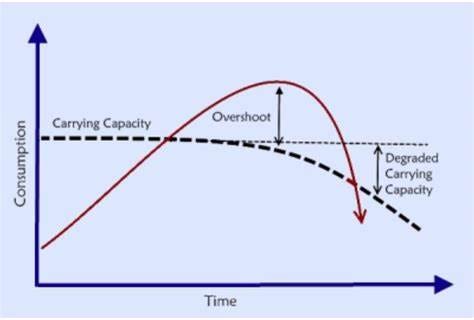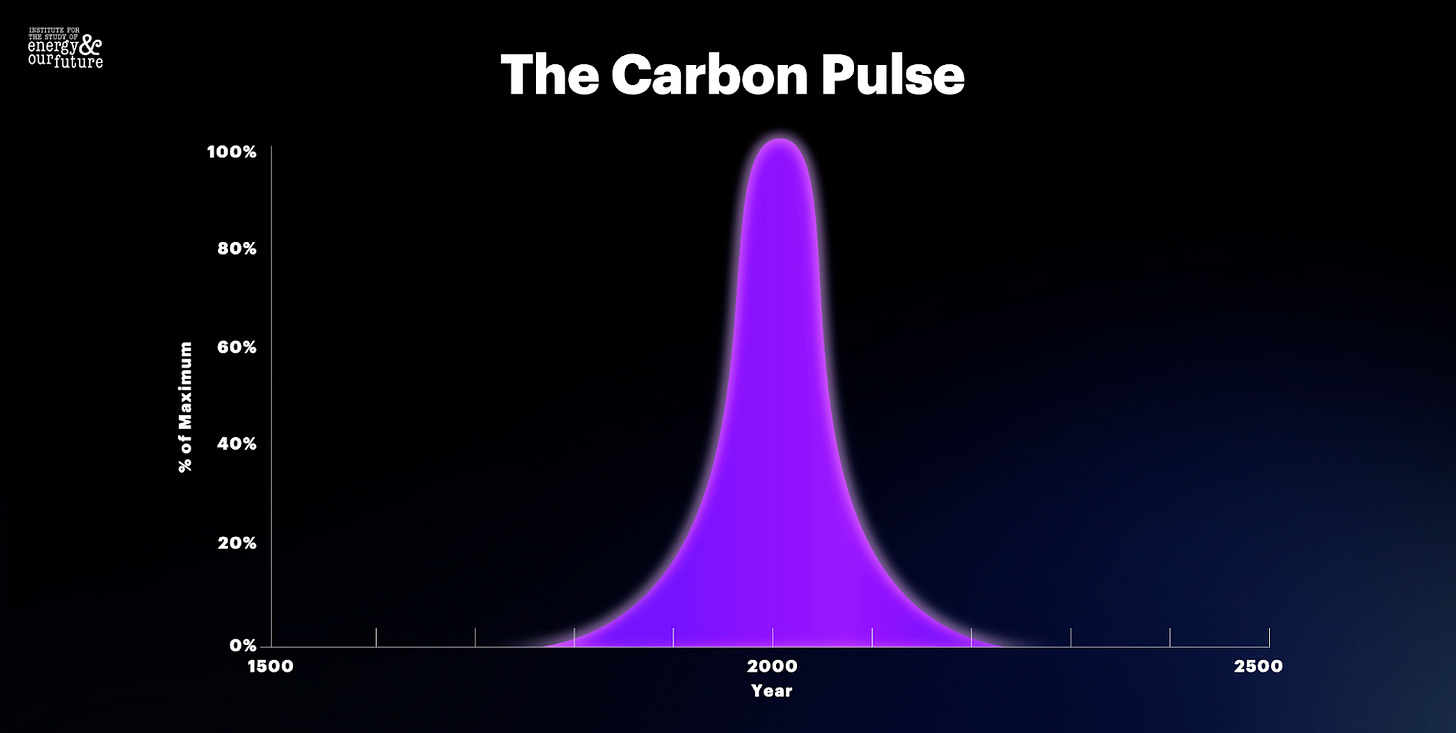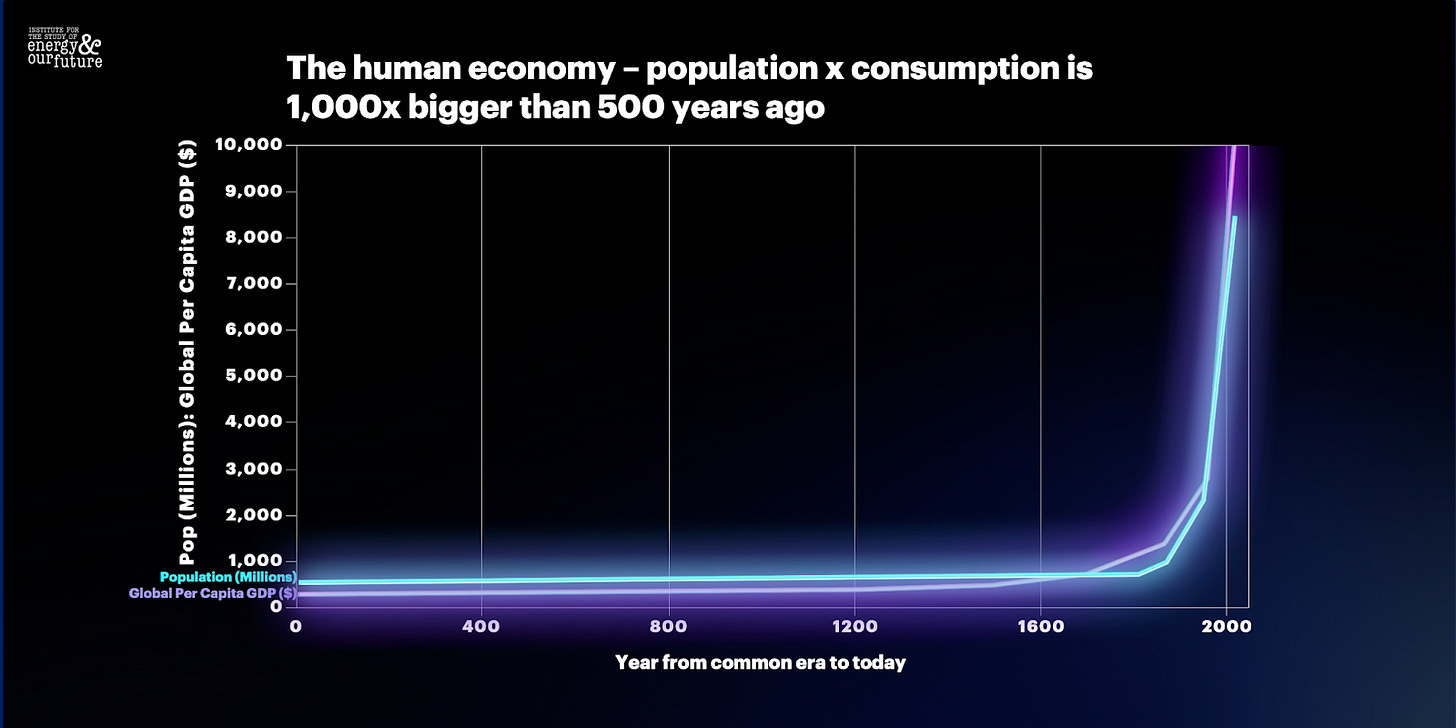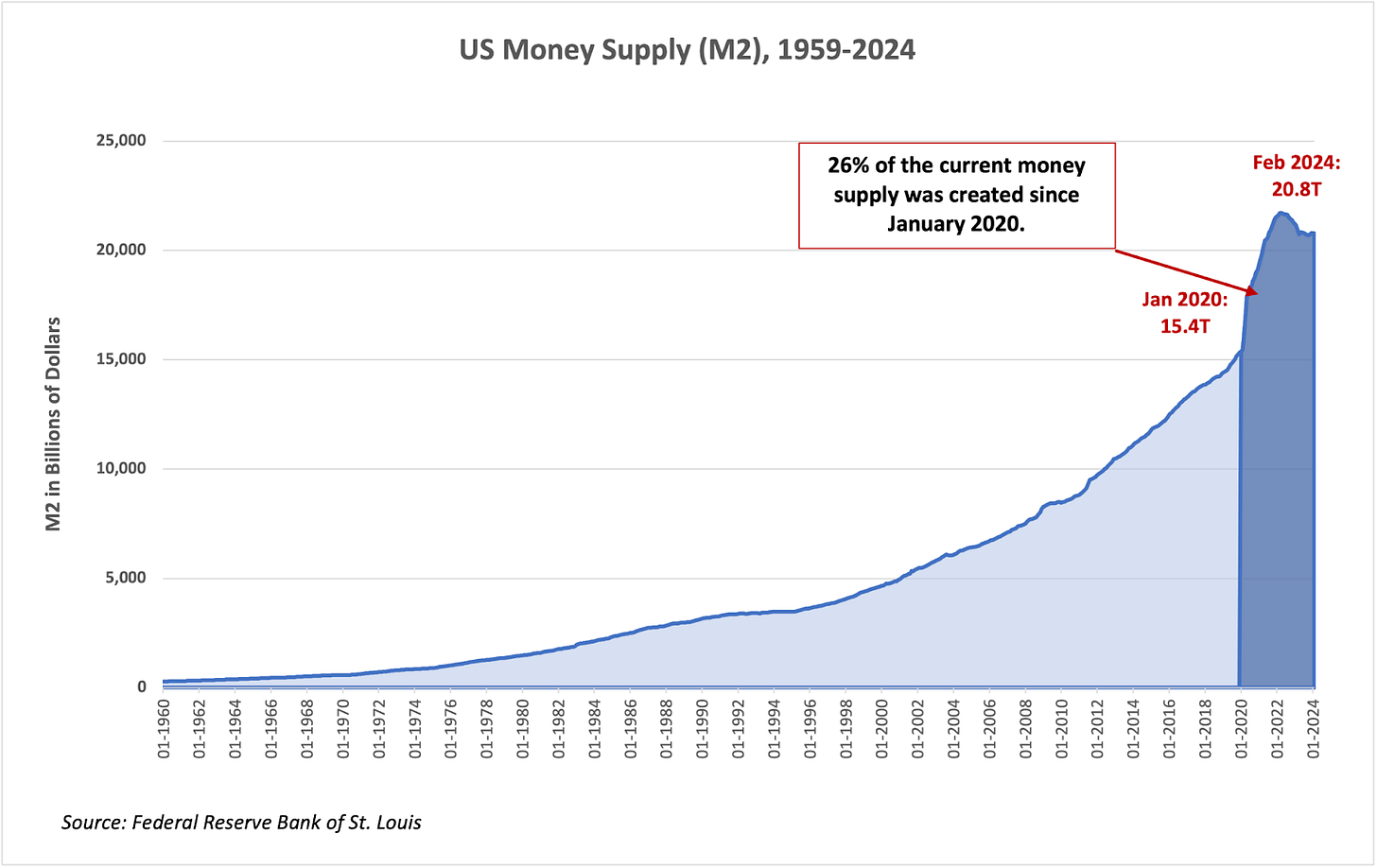The 7 Fundamental Drivers of Overshoot
On many Fridays of the past 2+ years we’ve posted a ‘Frankly’ episode to YouTube and podcast platforms. Most of the time, these are rough thoughts I record – sometimes with a pre-planned outline – but more often without preparation at all.

On many Fridays of the past 2+ years we’ve posted a ‘Frankly’ episode to YouTube and podcast platforms. Most of the time, these are rough thoughts I record – sometimes with a pre-planned outline – but more often without preparation at all. As such, after a day or a week passes, I metabolize and refine these original ideas, and have decided that, in some cases, I will edit and improve them in written form. Going forward, I will post these stream-lined ‘finished’ versions as essays a few weeks after the original Frankly airs.
Here is the first:
Introduction
Humanity is in overshoot1. The last 50 years have marked a unique period in history during which our species has been able to access, extract, and consume natural resources at a rate faster than the Earth is able to regenerate them. As humanity continues to grow its population beyond the carrying capacity2 of its environment, the associated excess consumption is degrading the health of Earth’s ecosystems. By over-consuming our environment—and ecosystem stability—in the short-term, we are putting our planet’s long-term stability and capacity to provide for future generations in jeopardy.3

Today, our species numbers 8.1 billion humans, consuming over 95 billion metric tons of raw materials per year. Climate change, ocean acidification, soil degradation, biodiversity loss, decline in insect populations, etc., can all be seen as symptoms of a species in overshoot. Somehow, we have managed to expand our consumption beyond the limits of the most bountiful planet we know of.
How did we get here? Why do we continue to go deeper into overshoot? And why don’t we seem to be doing anything about it? In this essay I will explore seven fundamental drivers of our overshoot predicament, before discussing some potential antidotes.
1. The Carbon Pulse
We are currently alive during “the Carbon Pulse.” A few-hundred-year period out of the 300 thousand years of human history, during which we are pulling ancient carbon out of the Earth millions of times faster than it was sequestered by the daily flows of the sun, soil, and plants. Since the 19th century, this massive consumption of fossil hydrocarbons has powered machines, which replace human and animal labor, creating a huge surge in productivity.

The abundant cheap energy available during the Carbon Pulse is the key input that enabled the unprecedented period of growth which has propelled humanity into overshoot. By hugely increasing the productivity of agriculture, cheap fossil energy has allowed us to increase mammalian biomass by 700% in the last couple hundred years4 and to more than double the global population of our species in just 50 years. This same surge in productivity has allowed us to access and extract raw materials at an ever-increasing rate, resulting in a tripling of our global consumption since 1970 — as well as ~1,000 times more than what it was in 1500 CE. Put simply, humanity’s overshoot is inseparable from the Carbon Pulse.

2. Money Creation without Biophysical Tether
More than a quarter of all U.S. dollars currently in circulation have been created since January 2020. When financial institutions like the U.S. FED create money, the scale of near-term human consumption is altered accordingly. However, the levels of consumption which planet Earth can actually sustain in the long-term remains unchanged. Whilst money can be created ‘out of thin air’, the resources and energy on which this money will eventually be spent require thousands of years to be regenerated. Current money creation is entirely untethered from the biophysical constraints imposed by Earth’s carrying capacity.

When we create more money — often in the form of debt — we get to immediately consume more goods and services today than we otherwise could. This accelerates the extraction of non-renewable resources and energy, as well as the deterioration of Earth’s ecosystems. Because finance is ‘ecology-blind,’ our economic systems remain untethered to Earth’s carrying capacity, the scale of money creation over past decades has allowed us to over-consume our environment beyond its natural limits, propelling us into greater levels of overshoot than would otherwise have been possible.
3. Economic Superorganism and Power Dynamic
As individuals or communities, we could hypothetically alter our behavior patterns so that – if extrapolated over the global population – our consumption of natural resources would align nicely with Earth’s regenerative capacities. Unfortunately, at a global scale, individual behaviors and choices are “downstream” of the aggregate behavior of the Economic Superorganism.5
The Superorganism is the emergent result of 8 billion humans coordinating in groups to maximize for financial surplus — which also indirectly maximizes for energy consumption. At a global level, the Superorganism optimizes not for efficiency or longevity, but for power, measured as effective work (energy per unit time). This means that current definitions of success rely on consuming as much energy as our system can “eat” as fast as possible. Within this framework, further ecological overshoot (a proxy for growth and consumption levels) can actually be seen as a good thing for the energy-hungry Superorganism.
Given that the decisions made by individuals, corporations, institutions, and governments are all constrained by the incentive structures embedded within this Superorganism, the continued exacerbation of our overshoot predicament appears almost inevitable.
4. Status, Competition, and Envy
Humans are a social species, each in competition for status and resources. Whereas historically status was sometimes linked to leadership or intelligence, in our modern culture it is markers and displays of wealth that have become the primary proxy for status. Actively reinforced by marketing, we have become socially conditioned to compete with each other for more money and more stuff, driving higher and higher levels of conspicuous consumption.6
Rather than rewarding individuals whose consumption patterns respect Earth’s natural limits, modern culture actively encourages individuals to over-consume their environment, making individuals in overshoot the object of envy.
5. Supernormal Stimuli and Addiction to Dopamine
In our ancestral environment, dopamine was released in response to behaviors and activities which were useful to our survival – like finding a bush of juicy berries or positive social interactions. Today, humans continue to seek out dopamine in the same way that our ancestors did, but access it through very different means.
Our modern context is full of supernormal stimuli — such as scrolling social media, stock options, and video games — which provide dopamine rewards far stronger and more addictive than those experienced by our ancestors. Additionally, prevalent consumption and technology are continually raising our baseline dopamine levels. As a result, we are continually seeking out stimuli that will give us higher and higher levels of dopamine, more and more frequently. Invariably, due to our cultural tech-stack, these will also become increasingly resource and energy intensive ways to receive our daily doses of this neurotransmitter, constantly pushing us towards overshoot-laden choices.
6. Lack of Ecological Education and Values
There is nothing new about humanity’s overshoot. Some form of what is being discussed in this essay has been true for the last 50 years. And yet still we don’t seem to be doing anything about it. Why?
Humanity may be highly literate and numerate, but we are yet to become ‘ecolate’ – fluent in the realities of what our ecosystems can, and cannot, provide. A species and culture-wide lack of ecological education not only impacts our values, but also prevents these types of conversations from entering the mainstream dialogue. So long as the majority of humans remain uneducated about humanity’s dependence on Earth’s ecosystems, discussions about overshoot and carrying capacity will hold no weight in influencing meaningful policy.
7. Cognitive Dissonance
The final fundamental driver of humanity’s overshoot is cognitive dissonance. Humans have many examples of cognitive dissonance in our lives, where our beliefs and attitudes are in conflict with reality. Given that this internal conflict is uncomfortable, we resolve it through rationalization, denial, or the avoidance of information which contradicts our pre-existing beliefs. This creates a widening gap between our physical reality and the subjective reality we create inside our heads.
This truth is not for the faint of heart. Acknowledging that we are a species in overshoot would mean acknowledging and accepting that many of our beliefs and hopes about the future are wrong. Because of cognitive dissonance, we are more likely to keep our heads in the sand and continue to increase humanity’s overshoot, rather than acknowledge and accept the painful reality of our overshoot predicament.
Antidotes?
Humanity’s overshoot was enabled by the Carbon Pulse. It has been exacerbated and increased by money creation, by the constraints of the Superorganism dynamic, and by our evolved behavioral drives for status and dopamine. Lack of ecological education and cognitive dissonance prevent us from meaningfully addressing this pressing circumstance.
So, what can we do? What antidotes might we employ to bring our global population and consumption levels back within the safe boundaries of Earth’s carrying capacity?
On one hand, ‘antidotes’ to our overshoot predicament will likely be forced upon us by biophysical constraints – such as depleting energy and mineral resources. Just as the abundant, cheap fossil energy of the carbon pulse enabled us to grow our population and consumption, eventual energy depletion will also cause us to contract. In fact, as we naturally readjust, we may even be brought back in line with our planet’s carrying capacity. However, humanity’s current extractive overshoot may cause Earth itself to reduce its carrying capacity and overall ability to “bounce back.” We are already seeing this with more extreme droughts and floods, higher wet bulb temperatures, increased heat stress, lower crop yields, and more. These trends paint an ominous future for humanity, and all life on Earth.
On the other hand, could ecological education and an associated change in values cause us to care about and address our own overshoot? For instance, instead of creating money with no reference to ecosystem services or non-renewable energy and materials, we could create money with some biophysical tether to productive capital, productive capacity, and/or ecosystem health. Instead of creating technology which continues to exacerbate our overshoot, we could create syntropic technology which meets basic human needs in synergy with ecosystems, watersheds, forests, soil, etc.
However, to shift our cultural conversations from human-centered to Earth-centered – and to widen the Overton window of acceptable responses to our current overshoot predicament – it will need to start with change at the level of the individual human. It will require each of us to acknowledge that, once basic needs are met, the best and most meaningful things in life are free. Perhaps then, if ~3 percent of people start leading simpler lives within a world that idealizes the opposite, and recognize that there are 10 million other species, who all depend on healthy ecosystems, with which we share the only planet known to hold complex life… then maybe, just maybe, things could change.
Want to Learn More?
If you would like to watch the original Frankly video that inspired this essay, you can do so here.
If you would like to see a broad overview of The Great Simplification in 30 minutes, watch our Animated Movie.
1 Overshoot refers to the phenomenon where a population’s consumption of resources surpasses what the ecosystem can sustainably provide over time. This often results in environmental degradation and a subsequent crash in population numbers as resources become scarce.
2 Carrying Capacity refers to the maximum population that an ecosystem can support given its limited resources (food, water, habitat).
3 Responsible consumption and production | UN Department of Economic and Social Affairs
4 Megafauna biomass tradeoff as a driver of Quaternary and future extinctions | PNAS
5 Economics for the future – Beyond the superorganism – ScienceDirect
6 Conspicuous Consumption refers to expenditure on or consumption of luxuries on a lavish scale in an attempt to enhance one’s prestige.
Read the full article at the original website
References:
- https://natehagens.substack.com/p/the-7-fundamental-drivers-of-overshoot#footnote-4-159009316
- https://youtu.be/-xr9rIQxwj4?si=sp6g_ksbqFB2Zwv8&t=890
- http://youtube.com/watch?t=890&v=-xr9rIQxwj4&feature=youtu.be
- https://youtu.be/-xr9rIQxwj4?feature=shared
- https://unstats.un.org/sdgs/report/2023/Goal-12/
- https://www.pnas.org/doi/10.1073/pnas.0801918105
- https://www.sciencedirect.com/science/article/pii/S0921800919310067
- https://unsplash.com/@jule_42?utm_content=creditCopyText&utm_medium=referral&utm_source=unsplash
- https://unsplash.com/photos/woman-in-blue-denim-jeans-and-black-jacket-walking-with-woman-in-green-jacket-Pw7i-YVg5uM?utm_content=creditCopyText&utm_medium=referral&utm_source=unsplash
- https://bsky.app/intent/compose?text=The%207%20Fundamental%20Drivers%20of%20Overshoot+https%3A%2F%2Fwww.resilience.org%2Fstories%2F2025-03-17%2Fthe-7-fundamental-drivers-of-overshoot%2F
- https://x.com/intent/tweet?text=The%207%20Fundamental%20Drivers%20of%20Overshoot&url=https%3A%2F%2Fwww.resilience.org%2Fstories%2F2025-03-17%2Fthe-7-fundamental-drivers-of-overshoot%2F
- https://www.linkedin.com/shareArticle?url=https%3A%2F%2Fwww.resilience.org%2Fstories%2F2025-03-17%2Fthe-7-fundamental-drivers-of-overshoot%2F&title=The%207%20Fundamental%20Drivers%20of%20Overshoot&summary=By%20over-consuming%20our%20environment%E2%80%94and%20ecosystem%20stability%E2%80%94in%20the%20short-term%2C%20we%20are%20putting%20our%20planet%E2%80%99s%20long-term%20stability%20and%20capacity%20to%20provide%20for%20future%20generations%20in%20jeopardy.&mini=true
